Search the Special Collections and Archives Portal
Search Results
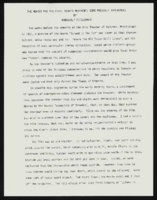
"The Movies and the Civil Rights Movement: Some Possible Influences": manuscript draft by Roosevelt Fitzgerald
Date
Archival Collection
Description
From the Roosevelt Fitzgerald Professional Papers (MS-01082) -- Unpublished manuscripts file.
Text
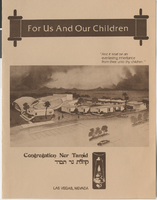
Brochure for building fund for Congregation Ner Tamid, early 1980s
Date
Archival Collection
Description
This fundraising brochure for the building campaign for Congregation Ner Tamid includes pledge amounts for specific parts of the building, and a proposed floor plan.
Text

Transcript of interview with Robert "Bob"Agonia by Marcela Rodriguez-Campo, September 6, 2018
Date
Archival Collection
Description
Robert “Bob” Agonia (1938- ) was born in Garden Grove, California on a migrant camp made up of Filipino and Mexican-American workers. Agonia’s father was a farmer on a 70 acre farm owned by the Beggs family. Agonia did not spend much time living on the migrant camp, as his father moved the family to a private residence when Agonia was four. Agonia attended school, during an era of school desegregation in Garden Grove. He recalls that his mother dealt with segregation during her schooling, being forced to attend a school miles down the road from her home despite living across the street from another school. Agonia recalls his community being very diverse with families sharing Filipino and Mexican-American heritage and his neighbors being Japanese Americans. Agonia participated in a multicultural Boy Scout troop. After high school, Agonia joined the Peace Corps and served in El Salvador. While there, Agonia worked in an agricultural research center in Santa Tecla where he helped local farmers select the proper insecticide for their crops. After the Peace Corps, Agonia had his choice of government jobs, ultimately selecting to work for the Internal Revenue Service. Agonia’s work with the IRS is what eventually brought him from California to Las Vegas. He quickly realized that the type of IRS cases he would be handling in Las Vegas were completely different from the work he was accustomed to in California. One of those unique cases required him to close the doors of a downtown casino. Since moving to Las Vegas, Agonia was critical in establishing a Las Vegas LULAC chapter, an American GI Forum, an EEO council, and the UNLV Engineering school.
Text

Transcript of interview with Liliam Lujan Hickey by Claytee D. White, September 7, 2018
Date
Archival Collection
Description
Liliam Lujan Hickey was born in 1932 Havana, Cuba, where her father owned an insurance company and her mother was a music teacher. At age 17, Liliam married Enrique Lujan who owned five casinos and who was twelve years her senior. It was the early 1950s, and the people of Cuba lived with stark distinctions between upper class and low-income families. Liliam and Enrique lived a life of luxury. She became accustomed to flying to New York for dinner and wearing the finest Italian silks for custom dresses. Then in 1959, Liliam’s life took a vast turn as Fidel Castro rose to power and seized assets from the wealthy class. This upended Liliam’s family and in 1962, Liliam, Enrique and their three children fled to the United States. They first arrived in San Diego, California, where Liliam took a job at the Scripps Clinic. While Liliam spoke five different languages, she attended night school to learn English. Eventually, Liliam and her family moved to Las Vegas where Enrique could find work in the casinos. Unexpectedly in 1972, Enrique passed away, leaving Liliam and her children to fend for themselves. Liliam was thrust into the role of matriarch; she learned how to write a check and drive a car. She describes this as a period when her community activism awoke, how she secured a position working for the Nevada Welfare Administration Office, and how her persistent spirit led her to citizenship within a week. Through friends, Liliam met Nevada legislator Thomas Hickey, an Irish American who she endearingly nicknamed her Pink Husband. Liliam credits Senator Hickey with teaching her about life and the world, and ultimately inspiring much of her political activism. She was an active member of the Latin Chamber of Commerce, first known as el Circulo Cubano. At the peak of her career, Liliam became the first Latina to be elected to the Nevada State Board of Education. She envisioned building a village through schools in order to support and help all students be successful. A local Las Vegas school, Liliam Lujan Hickey Elementary School, was named in honor of her public service. Today, Liliam is retired, but continues to work to increase civic engagement in the Latinx community and improve our educational system.
Text
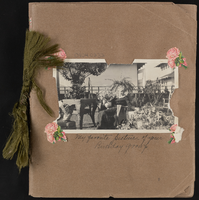
Helen J. Stewart birthday scrapbook
Date
Archival Collection
Description
Helen J. Stewart birthday scrapbook
Mixed Content
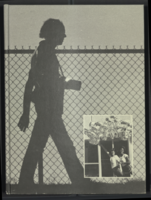
Epilogue: UNLV Yearbook, 1982
Date
Description
Yearbook main highlights: schools and departments; detailed lists with names and headshots of faculty, administration and students; variety of photos from activities, festivals, campus life, and buildings; campus organizations such as sororities, fraternities and councils; beauty contest winners; college sports and featured athletes; and printed advertisements of local businesses; Institution name: University of Nevada, Las Vegas
Mixed Content

Transcript of interview with Eleazar "Al" Martinez by Marcela Rodriguez-Campo, October 2, 2018
Date
Archival Collection
Description
In his lifetime, Eleazar Martinez has climbed both literal and figurative mountains as an avid outdoorsman and social justice advocate for Latinx issues. Born in Sweetwater, Texas, Eleazar (Al for short) grew up connected to the land and his family. Al comes from a large family with strong ties in Texas and Mexico. His mother worked the fields and his father was a construction worker who instilled in their children the importance of a strong work ethic and the pursuit of an education. Al shares about growing up during a time when Spanish was banned from schools and children would get punished if they were caught using their home languages. His experiences developed his aspiration to serve his community and fight for people’s rights. After a short stint in the Navy, Al followed his instincts and sought out a college education and majored in sociology. His interest in social issues lead him to serve in a range of roles from psychiatric support, community education outreach, and counseling. At one point, Al even helped mediate tensions between gangs and law enforcement in order to prevent violence from erupting. Since arriving in Las Vegas in 1998, Al has been working alongside diverse communities to build solidarity. Today, he works as a supervisor for the Whitney Recreation Center and leader in Hispanics Enjoying Camping, Hunting, and the Outdoors (HECHO). As Al would describe himself, he is “a proud Mexican Latino American, a Tejano with a Chicano attitude”.
Text

Marvelys Lopez Omaña oral history interview: transcript
Date
Archival Collection
Description
Oral history interview with Marvelys Lopez Omaña conducted by Monserrath Hernandez and Barbara Tabach on February 21, 2020 for the Latinx Voices of Southern Nevada Oral History Project. In this interview, Marvelys Lopez discusses her childhood and growing up in Caracas, Venezuela, where her father owned a toy store. She attended an all-girls Catholic School and from a young age knew that she wanted to be a doctor. In 1993, at the age of seventeen, she was able to study abroad in the United States for one year and moved to Las Vegas, Nevada. She returned to Venezuela to attend medical school and while attending medical school she met her husband, who was studying to be a registered nurse at the time. Lopez Omaña recalls volunteering as a firefighter in Venezuela, and discusses the political change that happened in Venezuela during her last years in medical school. She moved to back Las Vegas with her husband in 2003 and began working as a caregiver. She recounts Her first son's birth story, and describes how she became a Certified Professional Midwife.
Text

Horacio Lopez oral history interview: transcript
Date
Archival Collection
Description
Oral history interview with Horacio Lopez conducted by Laurents Bañuelos-Benitez on September 05, 2018 for the Latinx Voices of Southern Nevada Oral History Project. In this interview, Lopez discusses his early life in Cordova, New Mexico and arriving to Las Vegas, Nevada in 1963. He recalls the establishment of the Nevada Association of Latin Americans (NALA), the increase of Latin Americans in the southwest region of the United States, and his role as the Vice President of the Latin Chamber of Commerce. Lastly, Lopez discusses his thoughts on the future of Latino culture.
Text
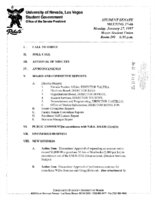
Meeting minutes for Consolidated Student Senate University of Nevada, Las Vegas, January 27, 1997
Date
Archival Collection
Description
Text
